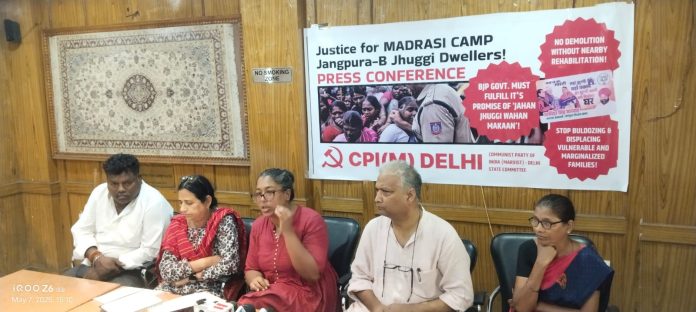– Abdul Bari Masoud
New Delhi: Over 400 families in the Madrasi Camp jhuggi cluster in Jangpura-B face eviction. This settlement is one of Delhi’s oldest informal colonies. It is located near Barapullah Drain in South East Delhi.
The colony has existed for over 60 years. It is listed as a notified basti under the Delhi Urban Shelter Improvement Board (DUSIB).
According to the NCT of Delhi Special Provisions Act, 2011, such areas cannot be demolished. The law mandates that alternative housing must be provided before eviction.
The Delhi unit of the Communist Party of India (Marxist) has strongly opposed the move. The party called it “inhumane, illegal, and politically motivated.” It demanded an immediate halt until proper rehabilitation is done.
CPI(M) Delhi secretary Anurag Saxena and other leaders addressed a press conference. They said demolition notices were served without verifying eligibility for rehabilitation.
Saxena said almost one-third of families were denied relocation unfairly. He added that those approved for resettlement are being sent to Narela.
Narela is nearly 50 km away. This violates the current resettlement policy.
The 2015 Delhi Slum and JJ Rehabilitation and Relocation Policy sets clear rules. It says resettlement must be in situ or within 5 km.
Any exceptions beyond this distance need special board approval. No such approval was given in this case, Saxena said.
A case (W.P. (C) 8035/2024) is in Delhi High Court. But residents still face constant eviction threats.
The Irrigation and Flood Control Department filed a report on October 5, 2024. It claimed the camp blocked the Barapullah Drain.
But engineers from IIT Delhi and IIT Bombay disagreed. Their fact-finding team found that bridges and flyovers nearby cause drainage issues—not the camp.
CPI(M) said environmental concerns are being misused. They claim poor people are blamed for infrastructure failures.
They demanded an independent technical review.
Residents say they’ve lived in Madrasi Camp for generations. Many work nearby and have children in local schools.
Relocation to Narela would affect jobs, education, and healthcare.
“We are not encroachers. This is our home,” said one resident. “Sending us far away will destroy our lives.”
The Housing and Land Rights Network released a report in 2024. It said Delhi had the highest number of forced evictions in 2022–23.
78 demolition drives displaced about 2.78 lakh people. Urban rights groups strongly criticized this.
CPI(M) also accused BJP-led governments of betrayal. The slogan “Jahan Jhuggi, Wahaan Makaan” is now a “cruel joke,” they said.
Instead of protecting the poor, the government is clearing floodplains for commercial projects.
The 2015 policy requires DUSIB CEO approval before demolition. Police can assist only after this approval.
But CPI(M) said Public Works Department and Delhi Police acted without DUSIB’s clearance.
They made several demands:
– Stop all demolition and eviction efforts until all appeals are resolved.
– Ensure in-situ rehabilitation or resettlement within 5 km.
– Use nearby DDA land for new housing if needed.
– Conduct fair surveys and appeal processes.
– Stop blaming slum residents for drainage problems without proof.
“The bulldozer should not decide who belongs in Delhi,” Saxena said.
He added that CPI(M) will join other Left and democratic groups. They plan to resist the eviction and defend workers’ rights.
Meanwhile, families in Madrasi Camp live in fear. Each day, they wonder if justice or a bulldozer will come.




